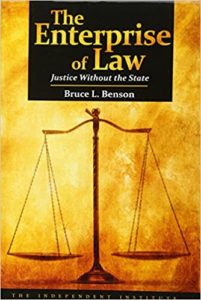One of the many horrible tragedies during the current pandemic has been the widespread outbreak of Covid-19 in prisons. Crowded with inmates and bereft of the medical resources necessary to care for the infected, American prisons have become death traps, and many of those incarcerated are now facing potential death sentences, even if they committed non-violent crimes. What are the alternatives to prisons if society wishes to punish criminals?
The Enterprise of Law: Justice without the State by Bruce Benson provides a provocative answer to that question. Benson begins by providing a historical review of the importance of Lex Mercatoria, or the merchant law, in helping to bring medieval Europe into the Renaissance. The merchant law evolved through a series of private institutions and actors in the commercial world as a way of guaranteeing that contracts could be honored and enforced across vast distances and between places that lacked a unifying governing system. The law adapted and changed as circumstances dictated through a sort of natural selection that pushed some aspects of the law into extinction while promoting the emergence of newer, more pertinent rules to replace the old ones. Even today much of international commercial law is based on the actions of business people and norms in the marketplace rather than the constructivist impulses of politicians and bureaucrats.

But Benson also provides numerous other examples to document many different types of legal structures that have largely been outside state control for the majority of human history in various settings, not merely in Europe or the United States. For example, he cites many instances in the developing world of tribal legal systems, such as that of New Guinea, that protected individual property rights in numerous and sometimes overlapping jurisdictions, rather than with a single, overarching state-enforcement mechanism.
Additionally Benson shows that the development of public and government-run police protection was largely unknown throughout the Western world until the nineteenth century. Until very late in the nineteenth century in England, individuals who were victims of crimes pursued prosecution. In the United States the Pinkertons and other private security forces were very much the norm until competitive pressures helped bring together political and business interests to push for public police services.
Benson also reminds his readers that today much of the legal work that needs to be done throughout the world happens in private venues rather than through government-mandated legal institutions. He notes that the vast majority of private business contracts have private arbitration clauses, partially because dockets in the developed world are overburdened and private courts have become popular and reliable. Additionally, the growth in private security firms has been prevalent not only in Latin America and the Middle East, but also in the United States despite the explosive growth in public police spending.
Benson then provides a public choice analysis of why the system of voluntary law and policing broke down and was eventually replaced by what he argues is a less efficient system of public provision of these services. Clearly the distribution of costs plays a key role in the maintenance of laws that do not endanger the public at large, have the support of narrow interests, and disperse the costs widely. This would apply, in Benson’s view, in the case of most drug laws. However, the enforcement of these types of laws leads to a “tragedy of the commons” when it comes to the proper provision of police protection and court resources to prosecute real and serious violent and property crimes. This, of course, creates incentives for those with the resources to fall prey to corruption and the temptation of using their personal interests to dictate the direction of services that should be “public” if possible.
As an economist with sympathy toward public choice, property rights, and free markets, Benson advocates for a more private, competitive system that he believes would best suit a world that is increasingly interconnected and less dependent on national jurisdictions to define what rules should be applied to specific transactions.
However, in terms of criminal law Benson’s positions are more controversial. For example, he speaks glowingly of the Icelandic system that essentially substituted a form of repayment for retributive and punitive punishment in criminal cases. This would be a radical departure from our current system, and one that could alienate those with greater concerns about the risks of privatization. Additionally, Benson advocates that prisoners work while incarcerated to repay their victims.
Such a system would raise complicated and politically unpopular questions about the nature of punishment in a democratic system. Focusing on repayment rather than other motivations for punishing law breakers, such as retribution, might seem odd today. But the idea that victims could be made financially whole for their suffering would at least provide some form of tangible recompense. And perhaps with fewer of these individuals in prisons recidivism rates might decline. And in the times of Covid-19 they might not be sentenced to die in prison hospital beds for crimes that hardly deserve that fate.
G. Patrick Lynch is a Senior Fellow at Liberty Fund.


READER COMMENTS
Matthias Görgens
May 7 2020 at 9:19am
Another relatively simple way to cut prison sentences without ‘going soft in crime’ is caning.
No clue whether it’s a good idea. It seems to sort-of work in Singapore in combination with prisons. It’s cheaper than prison.
It’s not as economically efficient as fines, of course
IronSig
May 7 2020 at 7:42pm
I’m honestly curious about the risk-management here. Does the caner or the canee have to carry insurance against the low-probability event of excessive and debilitating caning? Does the mandatory private insurance of Singapore treat it like a policy-worthy event?
john hare
May 7 2020 at 7:52pm
I tend to think caning and other forms of corporeal punishment might have some serious merit in many cases. The miscreant goes back to work tomorrow hurting instead of months in jail at taxpayer expense while the taxpayer is also supporting their family. One thing often ignored is that unlike most of the people on this list, many habitual offenders don’t mind being in jail, which to me explains a lot about repeat offenders in the first place.
I don’t actually know if it would be a good idea. And I certainly would not want to be the one making the call without a LOT more information. For major crimes, I think prisons or gallows will be here for a very long time.
SaveyourSelf
May 9 2020 at 7:48am
Repayment as a solution for violations of justice is an fine ideal, but it is highly problematic. First, not everyone participates in markets. Labor force participation rates in the US averages 63%, meaning 37% of people, on average, are not participating in the market. Participation in the market is where income is created. Thus financial remuneration might only be plausible for crimes committed by up to 63% of the populace. Second, forced labor by inmates to “pay back” their victims violates several of the requirements for markets–and therefore prices–to work. Notably, freedom. Without freedom, meaningful prices cannot be arrived at through voluntary exchange. Without meaningful prices, how much the inmate earns and what kinds of work are desirable to society are anyone’s guess. Markets ration though voluntary price discrimination. Without the voluntary you won’t have prices. Without prices you won’t have markets. Without markets you don’t have a way to produce the income needed to repay a debt. Third, cash recompense for satisfaction of justice is not new nor is it lost to history. I would wager nearly all of the cases mediated by private arbitration are solved by transfers of treasure. Which makes sense, the private arbitrators will require payment. Those who do not work, cannot afford private arbitration much less the payouts that arbitration may dictate. Forth, if my wager is correct, then I would predict the majority of the persons in the “public” criminal justice system are not active market participants when outside of jail. The real problem, then, is not the inefficiency of the jail system–a non-market institution. It is the incentives that keep such a large swath of the population from participating in voluntary markets in the first place–drugs, a host of adverse welfare system incentives, government obstacles to market participation like minimum wage, taxes, and benefits to name but a few.
Comments are closed.